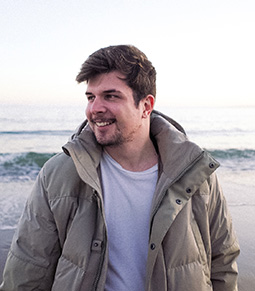This article is part of a series focusing on the grads of the Dalhousie Class of 2025. Spring Convocation takes place May 30 and from June 9-19 in Halifax and Truro. Read all our profiles¬Ýhere in one place¬Ýas they are published.
When Rafael Copstein was growing up in Brazil, he often played board games with his father, a long-time university professor of informatics.
One day his dad set up a game but noticed the box was missing the dice.¬Ý
“My father pulled up his computer and quickly coded a program that would serve the same purpose as a die,” Rafael remembers. “The fact that he managed to solve the problem using his computer skills amazed me. That was the moment I knew that I also wanted to do that.”
Discovering Dal
Rafael first came to Dalhousie in 2016 as part of an exchange program during his undergraduate studies. He wanted to transfer right away but decided to wait and apply for a Master of Computer Science to pursue his interest in coding.¬Ý
 One year into his master‚Äôs program, it became clear Rafael was thriving and had a knack for cybersecurity. His supervisor, Dr. Nur Zincir-Heywood, suggested he upgrade his graduate degree to a PhD.¬Ý
One year into his master‚Äôs program, it became clear Rafael was thriving and had a knack for cybersecurity. His supervisor, Dr. Nur Zincir-Heywood, suggested he upgrade his graduate degree to a PhD.¬Ý
This spring, Rafael is graduating with his doctorate and a thesis on cybersecurity. Building on skills and interests discovered in graduate school, Rafael developed a novel method for identifying system anomalies such as attempts at intrusion, hacking, and data exfiltration.¬Ý
Along with cybersecurity research, Rafael also discovered a passion for teaching.
‚ÄúDuring my PhD I had the opportunity to create and teach a course on cybersecurity and it was one of the highlights of my degree,‚Äù he says. ‚ÄúHaving students look up to you and be amazed at the things you can show them is priceless. Knowing I have positively impacted someone's life is easily my greatest achievement.‚Äù¬Ý
Better together
But Rafael says pursuing a PhD is not for the faint of heart.¬Ý
‚ÄúOne of the meanings of the PhD is that the person who holds the title is capable of performing scientific research, assessing their theories, and contributing new ideas to academia,‚Äù he explains. ‚ÄúIt is not enough to reach your goals; you have to make sure that you can record your journey in such a way that the academic community can follow it.‚Äù¬Ý
Rafael says that realization reinforced his belief that real impact is not achieved alone, but as part of a team.
He says there were plenty of times throughout his degree when he was doubtful, unsure, or lacking confidence.
I had to shake the uncertainty away and keep going.
“It takes a toll, and you start doubting your ability to pull through,” he says. “I had to shake the uncertainty away and keep going. You have to believe that it will be OK without being sure.”
Through it all, he says the sense of genuine comradery he found at Dal is what made all the difference.¬Ý
‚ÄúEveryone I had the chance to work with had my best interests in mind and wanted to see me succeed,‚Äù he says. ‚ÄúNobody ever questioned my feelings towards the work, and chose instead to help me navigate them instead of dismissing them.‚Äù¬Ý
‘Always remember why you love this’
Looking back, Rafael says remembering the spark that ignited the journey is crucial.¬Ý
While it can be easy to become bogged down in research, hypotheses, competitions, and work, he says he tries to remember how he felt when he was little boy, watching his father code a die for a tabletop game.
‚ÄúI try to always remember why I love this. I back on things that caught my eye in the first place,‚Äù he says. ‚ÄúIt might be an algorithm that amazed me or an app I built. I try not to forget the things that bring me joy and bring them along.‚Äù¬Ý

